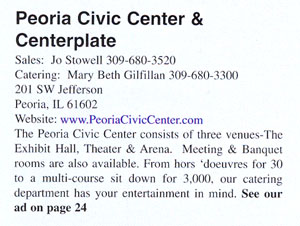The Heart of Peoria Commission (HOPC) is on the agenda for Tuesday night. They are recommending approval of the proposed elevations of Museum Square. But included in their request is a copy of the HOPC’s meeting minutes, and they reveal something of Caterpillar’s mindset.
Putting Museum Square parking underground is expensive. As was reported back in February, it may add as much as $3 million to the cost. At that time, the Journal Star editorialized that, essentially, this extra expense was the HOPC’s fault because they didn’t want to see another surface parking lot downtown.
Now it’s Caterpillar’s turn to play the blame game.
Despite the fact that Cat got almost everything it wanted in the museum site plan (except the surface parking lot) even though it severely compromised the Heart of Peoria Plan, and despite the fact that this project is continuing to get support from the HOPC, commission minutes reveal that Caterpillar representative Mark Johnson (Project Manager for the Caterpillar Visitor Center) wanted this line included in the commission’s recommendation to the council on Tuesday:
“The Commission recognizes that the inclusion of the underground parking structure in the site plan has resulted in a substantial increase in infrastructure development cost and urges the Council to work with the developers to adopt a mutually acceptable financing plan.”
In other words, he wanted the Commission to take responsibility for the additional parking expense on Museum Square. Why? The minutes state:
Mr. Johnson said, “I urge the Commission to step up to their responsibility, as we developed this underground parking as a part of this plan in response to this Commission’s strong recommendation; and we have to find a way to pay for it.”
Au contraire, replied commissioner Beth Akeson:
Commissioner Akeson said she was sorry the Commission has been put in the position to make it appear they are the ones that forced the issue of underground parking, when in actuality the Commission was never brought into the conversation about what its recommendation would be.
(Emphasis mine.) That’s right. It wasn’t the HOPC that came up with the underground parking idea. They weren’t even consulted.
In fact, the need for any parking on that site is questionable. Even if it could be shown that parking is needed, the bulk of the cost is not simply to put it underground per se, but to put it below the site as it’s currently designed — i.e., with the boomerang-shaped buildings. Those building designs were not the HOPC’s either.
Mr. Johnson’s amendment was defeated, but expect this argument to surface again — on the very next agenda item.
Caterpillar and Lakeview want to amend the City of Peoria/Museum Block Redevelopment Agreement. Among other things, they want to remove the $500,000 cap on TIF reimbursement. I imagine this will be the source of some discussion, as it’s the only part of the amendment that “could result in additional money being paid over by the City to the Museum.”
I have an idea. Instead of reducing the size of the museum by 15,000 square feet and trying to finagle more money from the city, why not make money and increase density by adding residential, restaurant, and retail components, like the Heart of Peoria Plan recommends? You remember the Heart of Peoria Plan, right? You know, the one the council adopted “in principle”?


